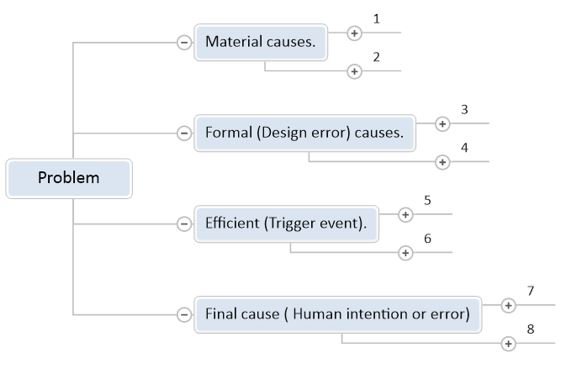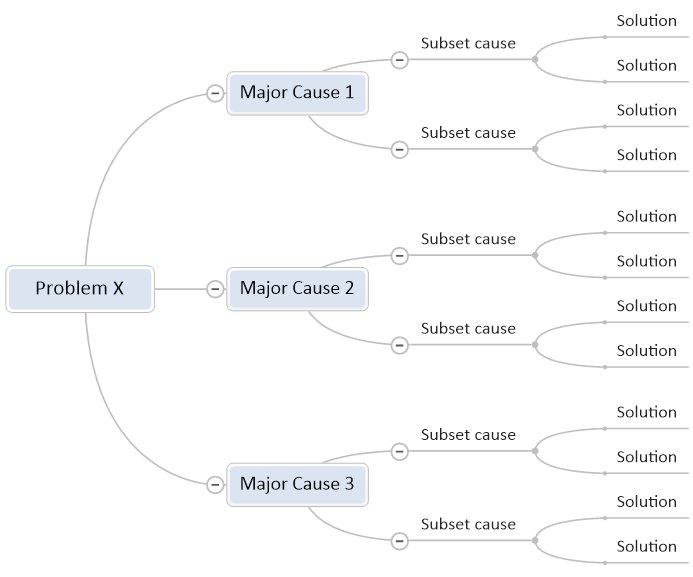How to Solve Problems
How to solve problems
We face problems throughout our lives, both at work and at home, most of which we can easily handle. However, when faced with more difficult problems, the ability to apply critical thinking and problem-solving skills will be of benefit.
Here are ten ways that will assist you to identify and solve problems.
- Keep your fearful imagination under tight control.
- Get the facts, never guess.
- Define the problem in writing.
- Take immediate action to mitigate any further loss or damage, caused by the existence of the existing problem.
- Draw a schematic diagram of the problem, showing all the known elements.
- Make a list of all the unknown elements, and any questions you need answered.
- Draw up a list of all the people and agencies who can help or advise.
- Don't talk to your friends and family about your problems, UNLESS they are experts in the field.
- With all the information gathered in the above steps, make your plan in writing.
- Implement the plan and observe the results.
1. Keep your fearful imagination under tight control.
When things go wrong, it is tempting to allow your fearful imagination to conjure up a host of horror stories, based upon incomplete information.
You must keep your fears in check.
2. Get the facts, never guess.
Gather every fact pertaining to the problem. Write everything down in a notebook to deal with this specific problem.
Never guess, and don't imagine. Instead, find out for sure. If in doubt, check it out.
3. Define the problem in writing.
Once you have all the facts, then crystallise the exact nature of the problem.
You need to understand what you are dealing with.
The most important step to solving a problem, is correct diagnosis.
4. Take immediate action to mitigate any further loss or damage caused by the existence of the existing problem.
The existence of a problem may be the cause of further problems.
Once you have identified the problem, you must then act to reduce the likelihood that problem A does not trigger problem B, C and D.
5. Draw a schematic diagram of the problem showing all the known elements.
You need to see the problem and all its moving parts in the form of a diagram. Sketch out a flow chart diagram and map out every known fact and variable.

6. Make a list of all the unknown elements, and any questions you need answered.
There will be some things you do not know. Make a list of all the things you don't know and need to find out.
7. Draw up a list of all the people and agencies who can help or advise.
Assume that every problem has been experienced by thousands of people before you, and they have solved the problem. Therefore, we can be sure that there is knowledge and expertise in the world that knows exactly how to solve your problem.
Your task is to gain assistance from those expert people and agencies who have experience with this type of problem.
Get expert help.
8. Don't talk to your friends and family about your problems, UNLESS they are experts in the field.
Friends and family will dish out bad advice and may take you off track.
9. With all the information gathered in the above steps, make your plan in writing.
Taking all the information and help you have assembled, write out the list of the first six things you must do, and in what order. Then do them.

10. Implement the plan and observe the results.
As you implement your first plan, the situation will change, and you need to keep a very close eye on how things are evolving.
Your actions will either:
- improve the situation, or
- fail to improve the situation, or
- it will make things worse.
Keep an eye on things and, if necessary, return to step one and repeat.
Problem Solving Training Course
We run a bespoke in-house Problem Solving Training Course to train your staff to develop their problem solving abilities. Delegates have told us how they feel more confident at handling problems and more skilful at identifying potential issues, after attending this course.
Definition: Ten-Step Problem Solving Process
The ten-step problem solving process is a structured business method of ten clear steps. You first steady your mind, gather facts and write the exact problem. Next, you map what is known, list what is unknown, seek expert help, and draft a written action plan. You then act, watch outcomes and loop back if required.
Show CG4D Definition
- Contains exactly ten sequential steps that guide the user from emotional control to outcome review.
- Demands full fact gathering before any diagnosis or decision is made.
- Requires written artefacts at key points: problem statement, schematic map and action plan.
- Ends with implementation and continuous monitoring, cycling back to step one when results shift.
Article Summary
Solve tough issues with calm focus: control fear, collect the facts, write the problem, map knowns and unknowns, seek expert help, then act on a written plan and watch the results. This ten-step loop turns worry into clear problem solving progress at work and at home.
Frequently Asked Questions
Here are some questions that frequently get asked about this topic during our training sessions.
What is the first step in the ten-step problem solving method?
How does gathering facts aid critical thinking?
Why should I define the problem in writing?
When should I draw a schematic diagram during problem solving?
What can I do if key details remain unknown?
Who should I consult about a workplace problem?
Why must I monitor results after I implement the plan?
Thought of something that's not been answered?
Did You Know: Key Statistics
LinkedIn Learning’s 2024 Workplace Learning Report shows that 68% of leaders name critical thinking and problem solving as the biggest skill gap in their teams. PwC UK’s 2024 Operations Pulse Survey finds that firms with formal problem solving training resolve issues 34% faster than those without.Blogs by Email
Do you want to receive an email whenever we post a new blog? The blogs contain article 5-10 minutes long - ideal for reading during your coffee break!
Further Reading in Decision Making and Problem Solving
-
Effective Decision Making
Learn how six decision matrix types simplify effective decision making. Compare options, cut bias and act with confidence. Free decision making apps included.
Read Article > -
How To Solve Problems
Learn a proven 10-step problem solving method that tames fear, gathers facts, sets clear plans and tracks results. Boost critical thinking at work or home.
Read Article > -
Be a Straight Thinker
Learn four simple rules for critical thinking that help you verify facts, judge source credibility, resist majority opinion bias and keep your logic clear.
Read Article > -
Five Important Problem-Solving Questions
Master problem solving with five questions: check facts, define the gap, write a plan, act on first steps, then repeat for ongoing improvement and results.
Read Article > -
Creative problem solving and decision making
Learn a nine-step problem solving method, three thinking tools and paper decision grids to turn feedback into smart decisions. Master clear, creative choices.
Read Article >
Looking for Leadership and Management Training?
If you're looking to develop your Decision Making and Problem Solving Skills, you may find this Leadership and Management Training Course beneficial:
Open Training Course Pricing and Availability
Next Open Course Starts in 21 days, Cheltenham Gloucestershire, places available






